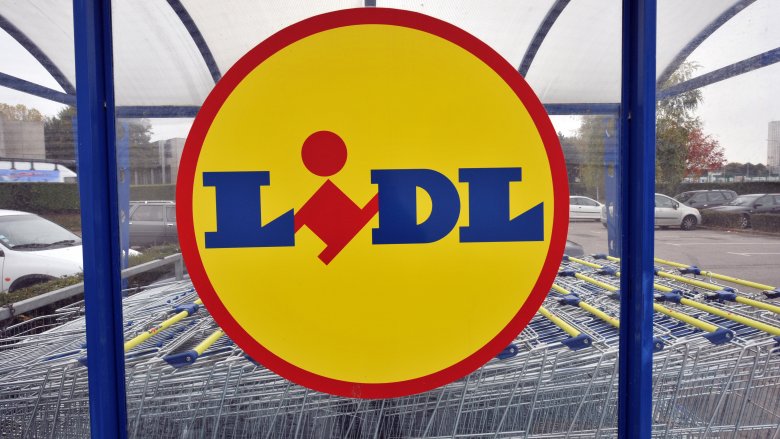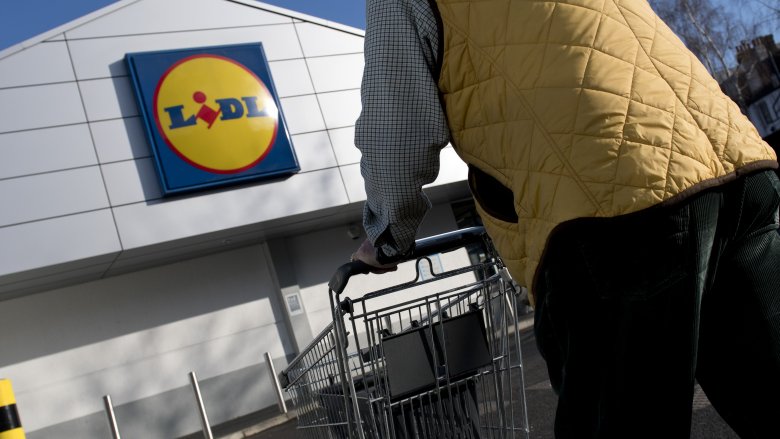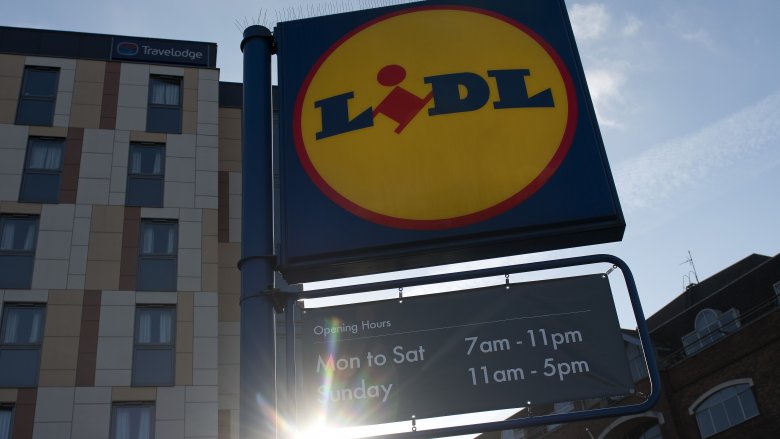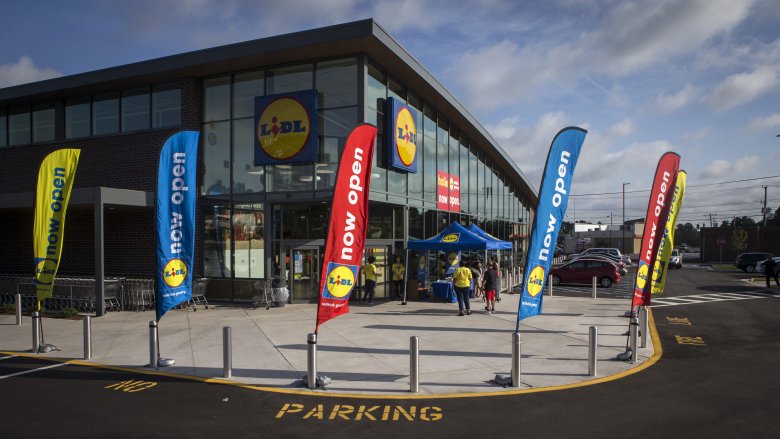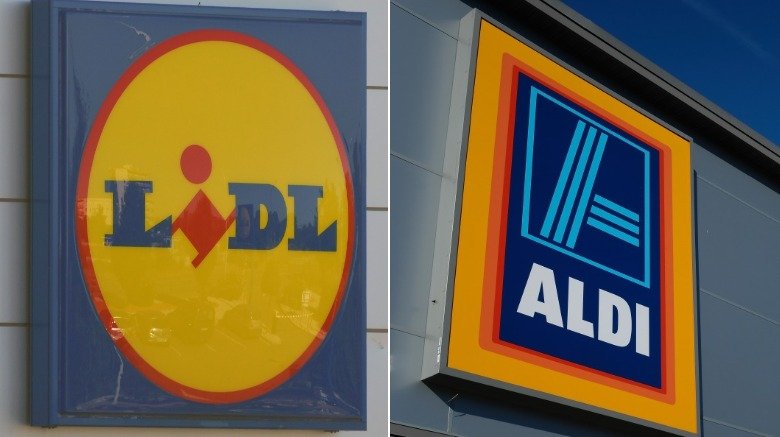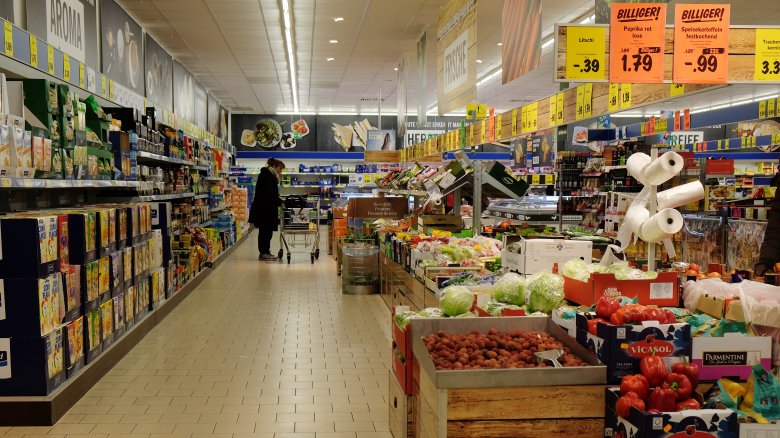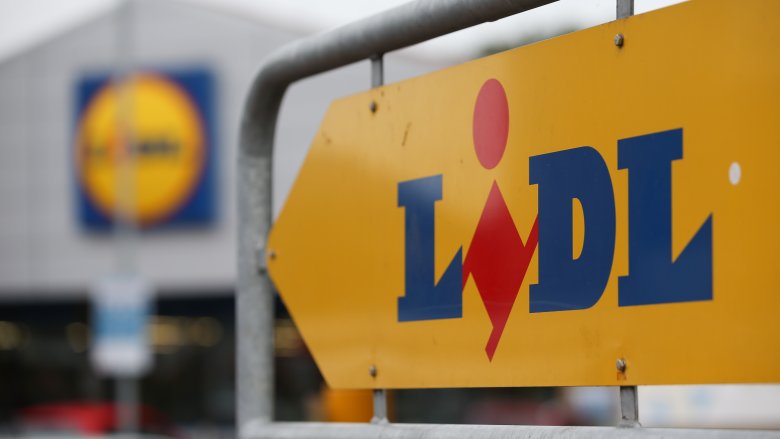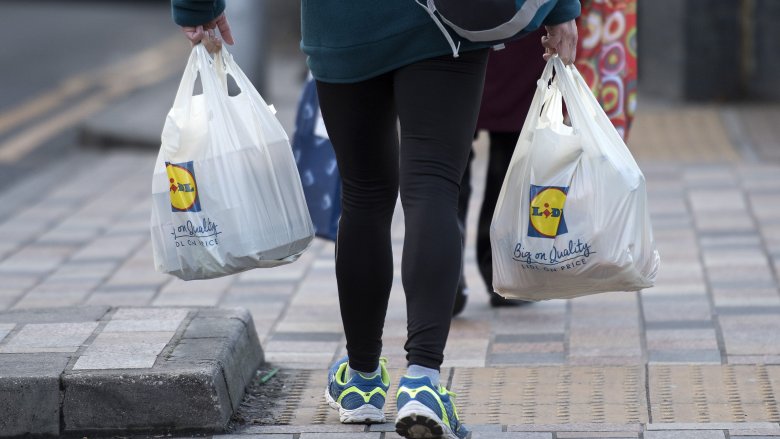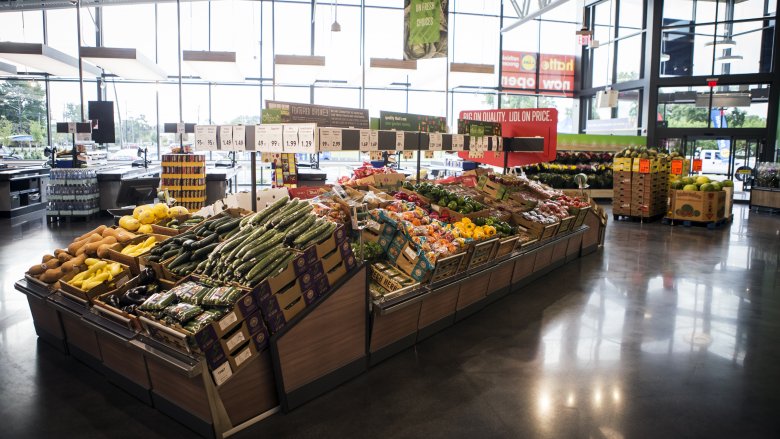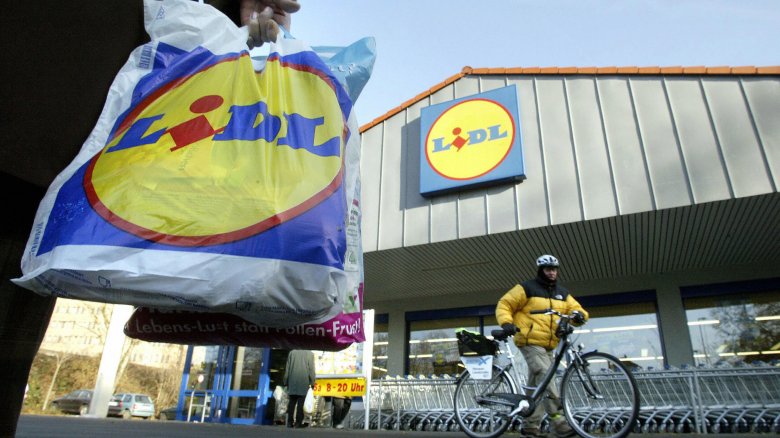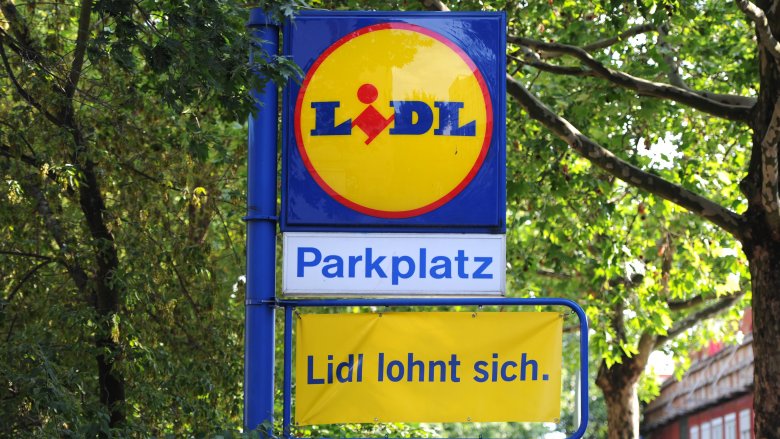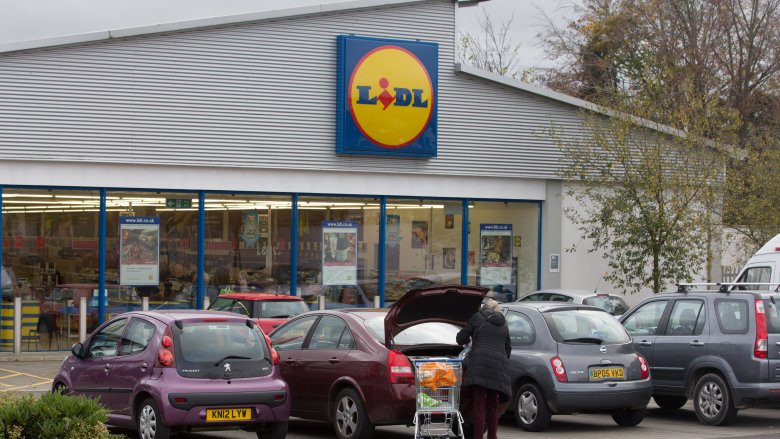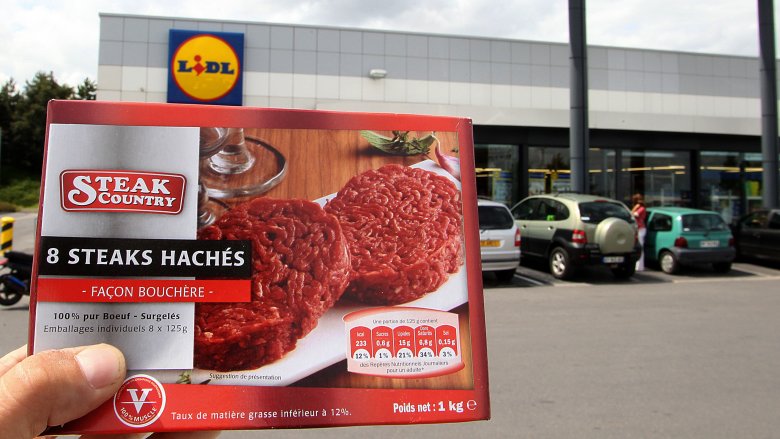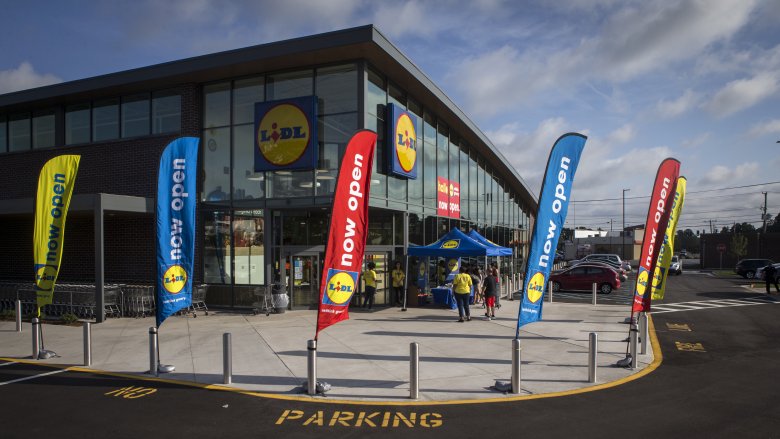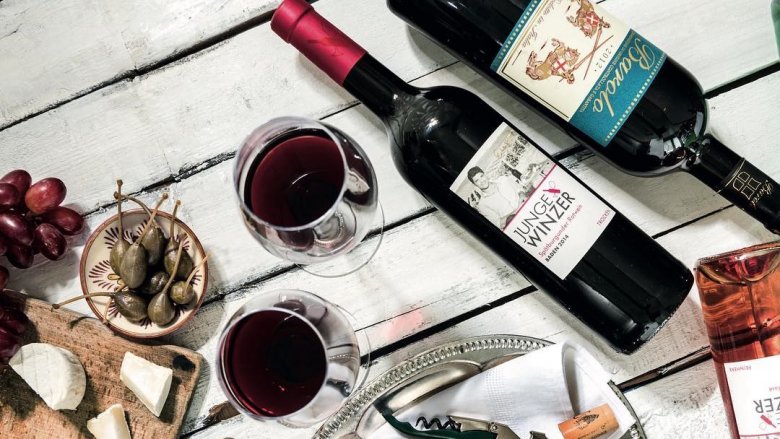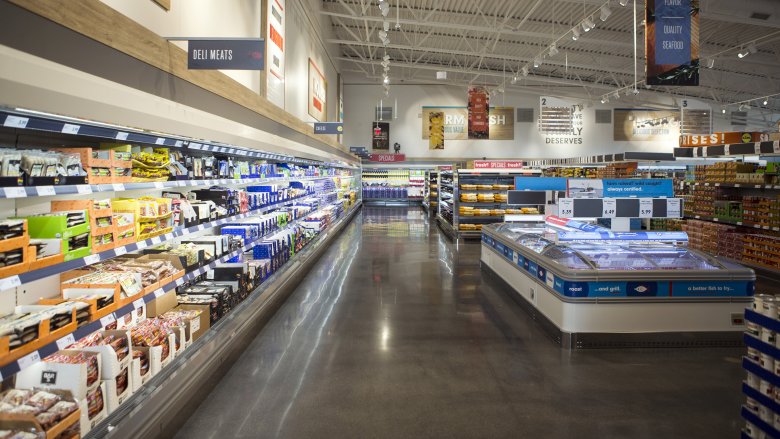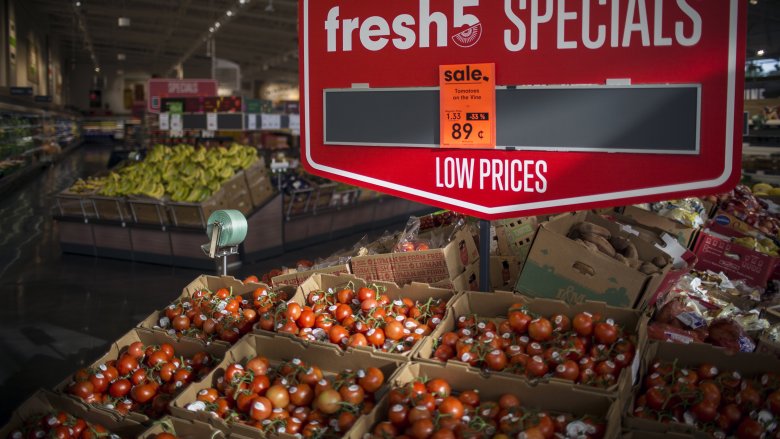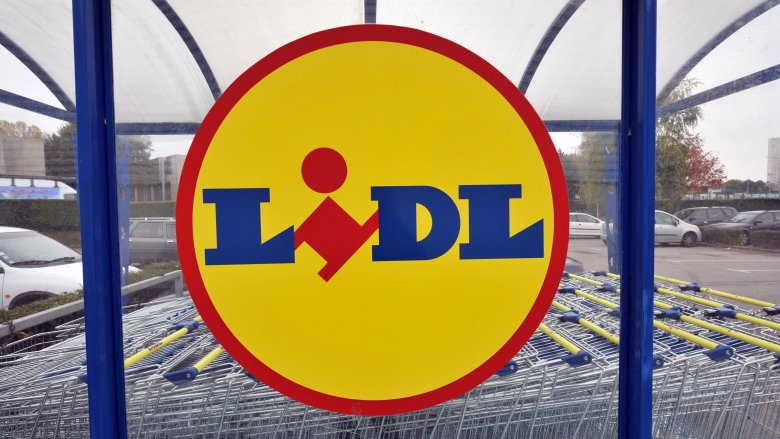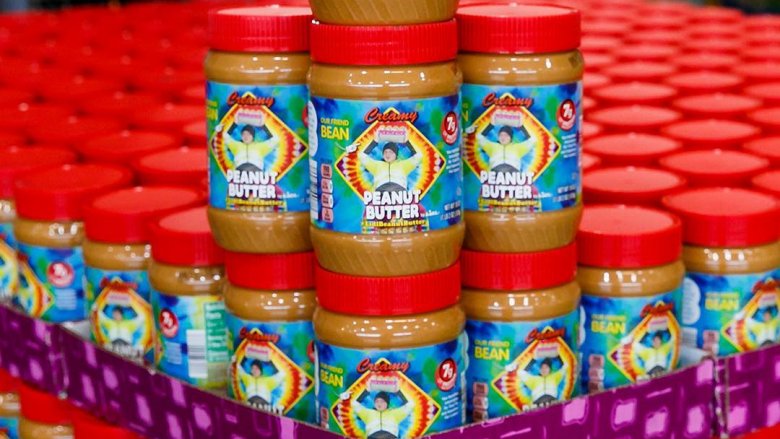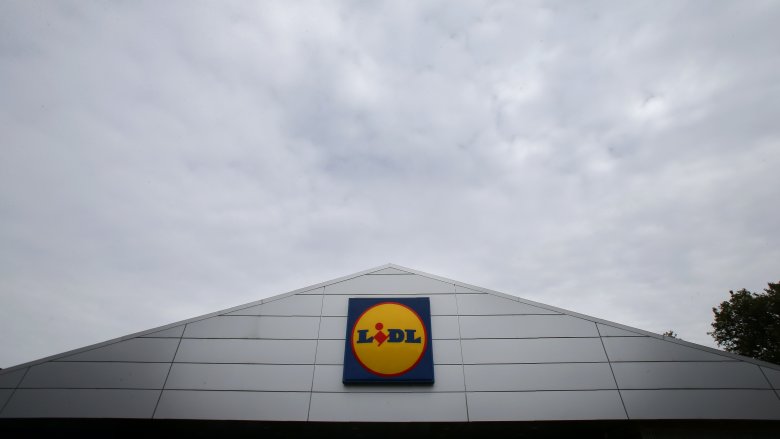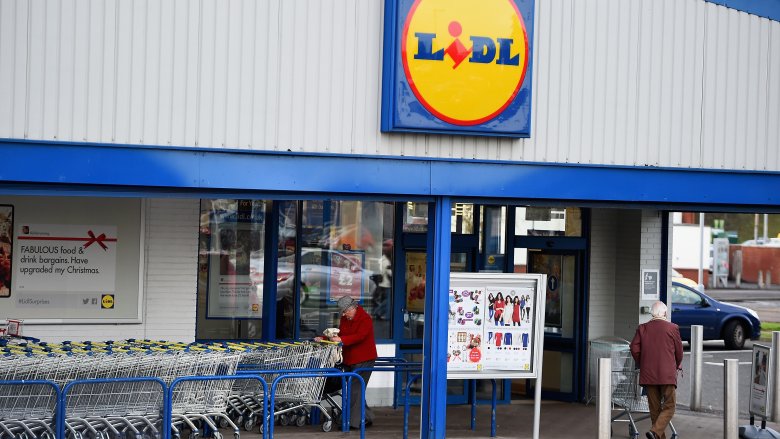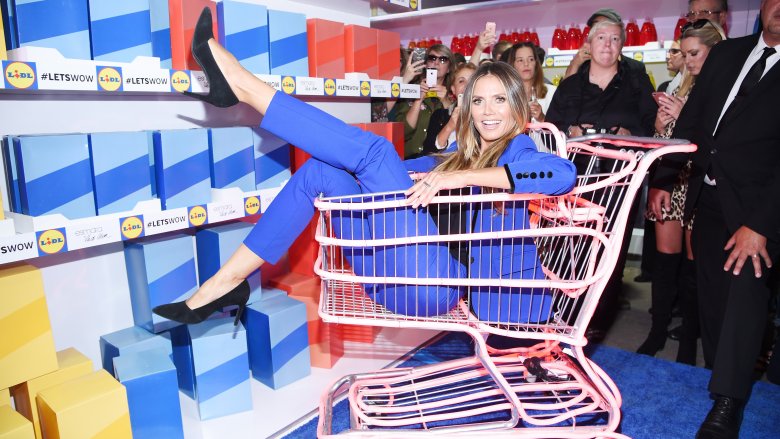The Untold Truth Of Lidl
The champion of US discount supermarkets, Aldi, may be getting some serious competition — straight from their home country. In 2017, German grocery chain Lidl (and that's pronounced "Lee-dul") announced they were taking a run at the American grocery market, according to USA Today. Their announcement came around the same time Aldi unveiled their $3.4 billion commitment to opening new stores in the US, and as for Lidl, they promised to have the doors of 100 stores open within a year of the announcement, by the end of summer 2018. They haven't quite made that happen, but they are taking major strides to make a name for themselves stateside, and Aldi loyalists are flocking to the locations they've opened so far.
So, who are they? They're similar to Aldi in that they both offer super-cheap pricing thanks to a bare bones business plan. They both rely heavily on their own private label brands, a small store footprint, and efficiency for savings they pass on to customers. But they're definitely not the same — in spite of rumors they're the same company — so let's take a look at what you should know about Lidl.
They broke the mold for US stores
At the time Lidl tried to break into the US market, they already had more than 10,000 stores across 28 countries (via Forbes). That's plenty of time to figure out what works and what doesn't but strangely, if you stop into any of Lidl's original 53 American stores, they're almost nothing like their European counterparts.
In Europe, Lidl stores are incredibly streamlined. Their products are about 90 percent their own private label, and they have an average footprint of only about 10,000 square feet. They only stock between 1,000 and 1,500 products, keeping their overhead low while still carrying all the basics customers need.
Lidl USA stores were built to be about twice the size, (with Winsight reporting some were envisioned to be around 36,000 square feet), and they carry an average of about four times as many products. That means they're not just bigger, but they're more expensive for Lidl to operate and saddles the company with a higher overhead. That may at least partially explain why they've opened fewer stores than they planned.
They're reimagining their American stores
The CEO of Lidl's parent company, the Schwarz Group, called their foray into America a "disaster" (via Forbes). It went so badly that plans for new stores stalled, and the Dayton Daily News even reported that some projects were mysteriously halted in mid-application. They wanted 100 US stores open by 2018, but barely managed half that before pulling the proverbial plug and going back to the drawing board. What went wrong?
Lidl counts on their low prices to get customers in the door, but things are a little different in America. With well-established chains like Walmart and Kroger boasting a price-matching program, that evens the playing field quite a bit. Add in some poor location choices and competition from Aldi, and Lidl floundered.
They're not giving up just quite yet, though. Food Navigator says there's still a huge potential for Lidl to step up. In a society where households are, on the whole, getting smaller, older, and more budget-conscious, Lidl — done right — is just the sort of store Americans could come to love. They appointed a new chairman in early 2019 — one with roots at Aldi — and they're focusing on a wide range of store plans, locations, and promotions.
Kroger welcomed them to the US by suing them
When Lidl first opened in the US, they were in the country for about two weeks before they were handed their first lawsuit by rival grocery store Kroger. Welcome to America!
According to Fortune, the lawsuit focused on a perceived trademark infringement which Kroger claimed would lead to brand confusion. Lidl's house brand, Preferred Selection, was too close to Kroger's brand, Private Selection, they said. Kroger also claimed that since they had spent 20 years building up their name brand, the confusion would give Lidl an unfair advantage as customers would think the two were related, and entice them to shop at Lidl, believing they were a division of their tried-and-true favorite, Kroger.
Lidl was having none of it, stating (via Business Insider), "Kroger is using this lawsuit to try to: disrupt the on-going launch of a new, emerging competitor that offers consumers high-quality products at far lower prices ... by painting Lidl as a copycat — when in fact Lidl is a decidedly different and (better) grocery experience."
Only a few months after the lawsuit was filed, Supermarket News reported that the case had been dismissed — with prejudice.
The differences between Aldi and Lidl
So, when you have the option to choose between Aldi and Lidl, what are the practical differences you're going to see when you walk into the stores? The State shopped at both in 2017, and found some major differences. While European Lidl stores have the same coin-operated shopping carts Aldi does, they aren't doing that at their American locations. Also, Lidl stocks some name-brand types of alcohol, while Aldi is strictly private label in that department. Prices were comparable at both stores, and the stores even have similar looks.
While Lidl has struggled to make a break into the US, Aldi has had some serious success. But Handelsblatt Global says there's something weird going on here, and it has to do with customer loyalty.
Marketing surveys have shown that customers actually rate Lidl more favorably than they rate Aldi, and that's a huge deal. Lidl scores higher in things like price, freshness, and quality, and surveys have also found that about half of Aldi regulars also shop at Lidl. Lidl is also a bigger hit among shoppers in the 18 to 24 age bracket, so is it possible that Aldi has some competition sneaking up behind them?
The chain started in 1930... and again in 1973
Lidl has roots that go back to the 1930s, when entrepreneur Josef Schwarz invested in a tropical fruit business, marking the foundation of the Schwarz Group. Schwarz he had started to turn his fruit business into a grocery when plans were disrupted by the outbreak of World War II. He didn't move back to Heilbronn until 1954, and even though he opened a warehouse in Northern Württemberg and built the foundations of the business, it was his son, Dieter, who opened the first Lidl in 1973.
Josef died in 1977, and Dieter took over the empire. He's still at the head of it all, and according to Bloomberg, he set up the company so he has complete control over every decision that's made. Because of that, under German law it's considered to all be a part of his personal fortune, and that makes him worth a staggering $22.1 billion.
There were some naming issues
Lidl wasn't the first choice for the name of the chain, and The Guardian says the first choice — Schwarz-Markt — just couldn't happen. Translate that, and it essentially means "The Black Market"... so you can see why they didn't go that way. It was decided store co-owner and retired schoolteacher Ludwig Lidl would be paid for the rights to use his name for the store. You might think he struck it big and could retire secure in the knowledge his name was plastered all over a multi-billion-dollar company, but you'd be wrong.
According to Bloomberg, Schwarz gave Lidl 1,000 deutschmarks for the use of his name. When the stores opened in the 1970s, that was around $500.
The low prices aren't good for everyone
Lidl carries a ton of their own, private label products, and that allows them to sell things incredibly cheap. While customers might love the low prices, there's a dark side to all those cheap foods.
In 2015, farmers in Northern Ireland blockaded a Lidl distribution center in protest over the price of milk. Essentially, Lidl was selling milk as a loss leader — a product so cheap they wouldn't make money on it, but it would get customers in the door and spending money on other products. Since they were selling milk at a third of the cost it took dairy farmers to produce it, farmers were calling foul and saying the discounter was essentially forcing them out of business (via BBC).
It's not just milk, either. In 2016, farmers were protesting in Dublin over the cheap prices Lidl (and Aldi) were using to sell their produce. Those cheap prices were such a big deal they were changing the market norm, and was making it impossible for farmers to produce fruit and veggies while making ends meet (via Agriland).
Lidl's founder is super-private
Dieter Schwarz isn't just super-private, he's so private The Guardian says there are stories suggesting he once turned down an entrepreneurial award because he didn't want to have his picture taken. It's unclear whether or not that's true, but we do know there are only two confirmed photographs of him in existence — and one's in black and white. That's pretty impressive in today's technological era, and that also means there are a lot of secrets Lidl just isn't giving up.
Not surprisingly, there are plenty of rumors surrounding the man. In 2010, German outlet Suddeutsche Zeitung tried to get a closer look, and found that he was so unrecognizable even in his hometown of Heilbronn that he could walk through the streets without anyone knowing who he was. They hint at secret addresses for his office, pastors who stay mum about rumors that he occasionally preaches from the pulpit, and whispers of charitable projects funded by a mysterious benefactor who insists he goes unnamed. They were stonewalled at every turn, and said the entire city seemed curiously quiet when it came to the billionaire businessman.
Business practices are super-secretive, too
The Guardian also says it's unclear just what sort of structure the Schwarz Group (which includes the warehouse retailer and discount company Kaufland, as well as Lidl) has behind those closed and locked doors, but they say it's a web of close-knit, interconnected companies, foundation, boards, and councils.
Lidl has gone head-to-head with unions before, and The Guardian says they not only discourage their employees from unionizing, but they frown on workplace councils, too. Verdi reps say Lidl stores with employees who organize into any kind of cohesive group are closed, while other employees say those who speak out are at risk of unemployment or a transfer to a store miles and miles from their homes. All that compounds to make Lidl as far from an open book as you can imagine.
They seriously violated privacy rights of their employees
In 2008, Lidl made headlines with some shocking revelations: they weren't just spying on their employees, but they were keeping detailed records of their health concerns, personal finances, romantic relationships, and more. According to The Irish Times, hundreds of handwritten documents were found, including notes on the successes and failures of employees' artificial insemination appointments, blood pressure readings, and work absences. The managers' notes were then taken to the regional manager on a monthly basis, when decisions about each employee would be made. The Guardian added they had details on everything from the location and composition of tattoos to details divulged during phone calls made on breaks.
Shockingly, Lidl not only admitted that they knew about and condoned the surveillance, but that it was company policy designed to help pinpoint potential threats to their bottom line, security, and to establish a baseline that would allow them to pick up on any abnormal behavior before it became a problem. A month after the details were released, Spiegel Online quoted supervisory board member Klaus Gehrig as saying the surveillance wasn't going to stop, but they would make employees more aware of the monitoring and allow them to view footage at any time.
There's no real public face
After the 2008 controversy over Lidl's policies of collecting personal details on their employees boiled to the surface, it was spokesperson Petra Trabert who issued an official statement, and supervisory board member Klaus Gehrig who clarified their continuing position to Spiegel Online. That's a bit odd, because most companies have people in positions dedicated to things like social media and the press, but Lidl doesn't. According to The Guardian, they appointed a press officer in 2006, but the position disappeared about a year later. Public relations are at a minimum — so minimal the UK news outlet was amazed Lidl was able to rebound after the expose on their employment practices.
They've received millions in public funding
Let's start by saying that Lidl is in no way accused of doing anything shady here, and when a 2015 article in The Guardian reported they had been lent almost a billion in public funding for expanding across central and eastern Europe, they needed to add there was technically nothing wrong with this. Given that the Schwarz Group is in the control of one of the wealthiest families in Europe, it didn't go over well.
The idea they were using so much public funding irked many, especially worker unions. While Lidl claimed their expansions were bringing jobs to impoverished areas, unions were pointing at their less-than-stellar track record when it came to their employees. It's no joke, either — among the damning documents were some from Poland, where Lidl repeatedly violated laws that said employees needed to have at least 11 hours off work every day. When they interviewed the people these stores were supposed to be benefiting, they were less than impressed that the giant was squeezing out more and more small businesses and using public money to do it.
They had to apologize after one store was caught poisoning the homeless
Apparently, 2008 was a rough year for Lidl. According to The Telegraph, a Lidl in one of Stockholm's suburbs was busted for some serious endangerment. Employees who claimed they were sick of the city's homeless showing up to pull expired food out of the trash bins decided to pour cleaning liquids and detergents over the food to keep them away. They posted signs saying they'd poisoned the food... but the starving people took it anyway.
Lidl's Swedish CEO apologized, saying their actions weren't condoned by the company. That apology came on the heels of another apology, this one for a marketing campaign that required the purchase of alcohol to enter a competition (which seemed to contradict the nation's policy of strict moderation). Then, there was more outrage when several Lidl stores in Sweden were caught selling meat that wasn't 100 percent meat... all leading to the need for some major damage control.
They're known for being really rough on employees
There was an entire book written on Lidl's offenses toward their employees. It's called The Black Book on Lidl in Europe, and it was a compilation of stories told by Lidl employees and collected over the course of two years. According to The Independent, Lidl employed around 151,000 people when the book hit, and more than 200 stores were implicated.
There was some seriously dark stuff in there, and a number of workers spoke about what shop workers' trade union Verdi called a "climate of fear". Workers needed to report for work — and start working — before their shift started, amounting to countless hours of unpaid work. Workers who didn't meet outrageous standards were often accused of theft and forced out of the company, and management was tasked with searching employees and their personal property to make sure they weren't stealing. Bathroom breaks were reported to be a luxury they weren't always given, and one former cashier said she wasn't allowed to leave the register, "so I sometimes went home with wet underwear." Later, purchasing agent Robin Goudsblom spoke to Spiegel Online he admitted they'd made some mistakes, saying "We are not a perfect company. We also have a lot of room for improvement — especially [in] the way we treat employees."
They've won some major awards for their wine and liquor
Head to Lidl's wine, beer, and liquor section, and you shouldn't discount what they have on offer. In 2017, their Cremant de Bourgogne Blanc NV took home a silver medal at the International Wine & Spirits Competition (via The Independent), and that's not too shabby — especially considering a bottle will run you £7.99 (or about $10), while similarly-ranked champagnes cost in the neighborhood of £50 (or around $65).
It's not just their sparkling, champagne-like wine they're serious about, either. They took home a gold medal for their Queen Margot 8 Year Blended Scotch Whisky from the International Wine & Spirit Competition in 2014 (via The Telegraph), and in 2017 they've been given awards for their Dundalgan whisky, their Castelgy London Dry Gin, and their Irish Liqueurs from the International Spirits Challenge, and for their Prosecco from The Prosecco Masters.
They're super-sustainable
Lidl isn't just about selling all your grocery basics at a low price, they're also about saving the world. Sort of.
When it comes to what they define as "quality," they're not just talking about taste and price: they're also looking at sustainability. Take seafood, for example. They've made a promise that all of the seafood you'll find on their shelves is either responsibly farmed or certified sustainable, and they partner with the Marine Stewardship Council, the Aquaculture Stewardship Council and the Global Aquaculture Alliance to make certain of it.
There's a whole slew of certification labels you'll see on their products, including the ever-popular USDA Organic labels and the Non-GMO Project label. Then, there are also products that are produced in partnership with the Rainforest Alliance, the Roundtable on Sustainable Palm Oil, and Fairtrade International. Those little labels mean a lot!
Then, there are individual products. Their honey has been certified by True Source Honey and is completely traceable, and their olive oil is independently tested and confirmed as the real stuff before it hits the shelves. Oh, and if your recycling is piling up? They're helping there, too, and they're in the process of installing in-store recycling centers to help you get rid of plastic waste (via The Journal). So far, this is only happening in Ireland, but fingers crossed it's coming soon to a Lidl near you!
Removing single-use plastics
Plastic is a huge problem, and there's tons and tons and tons of it filling the planet's oceans. According to Greenpeace, a huge amount of the plastic we throw away in our everyday lives comes from grocery stores, and that's why senior oceans campaigner Louise Edge praised Lidl's announcement (via The Guardian) that they were going to be getting rid of single-use plastics in their UK stores.
To be more specific, the plastic they're getting rid of is the black stuff, especially trays. That tends not to be recyclable, as sorting machines can't see it. In September 2018, Lidl said they were starting with the plastic that comes with fruit and vegetables (then moving on to meat, poultry, and seafood), and they said it would make a huge difference. They expect to see a reduction of waste by about 100,000 pounds each year once the transition is complete.
They say that's just the beginning of plans, and customers can expect to see more changes down the road, like making 100 percent of the packaging on their private label brands either widely recyclable, able to be reused, or designed to be refilled.
There's a wide variety of store concepts
Lidl has a surprisingly wide variety of store types and layouts, and the one that shows up in your town might bear little resemblance to your aunt's Lidl.
Take the "Prototype Store," which is ultra-modern, ultra-sustainable, with wide aisles (and parking spaces) and a focus on "creat[ing] an enjoyable shopping experience". In other words, it's your standard, stand-alone Lidl (that's very different from the bare-bones European stores). Then, there's "Special Stores," and those are the ones they'll set up in, say, a historic town. That's the one that's set up inside an old Masonic lodge or fire station, and it's their way of essentially converting historic buildings into modern Lidl stores.
They've also got plans for "Mixed-Use Concept Stores," which are the ones that take over relatively small spaces in cities and urban spaces, which is a little different from their "Shopping Center Stores" — which are, of course, Lidl as either a tenant in or owner of a shopping center and sharing space with other retailers.
When Lidl opens on its own, it tends to be much bigger than their closest competitor. According to Winsight, the first Lidl stores to open in the US were more than twice the size of a standard Aldi, coming in at 36,000 square feet. There are other, smaller stores also in Lidl's architectural catalogue, though, and the first one opened in Maryland in January 2019.
Their private label brands support some worthy causes
If you like supporting charities with your purchases, there are a few partnerships Lidl has already made in the US to continue a tradition they've already established in their European stores. In 2018, Lidl learned that 15-year-old Virginia resident Eric McKay was a huge fan of their peanut butter. Store Brands says that after he tweeted them, they told him they would hook him up with a lifetime supply if he got 72,000 retweets. He did, and they did... but the story doesn't end there.
Not long after he got his first pallet of peanut butter, the government shutdown happened. McKay's father was a federal worker, and the family knew many impacted by the shutdown. When Lidl found out that he was going to help families by giving away some of his peanut butter, they reached out to him again — and in April 2019, they kicked off an autism awareness campaign that featured special jars of peanut butter with McKay's picture on them, a donation to charity, and special, sensory-friendly shopping hours.
They've also done different partnerships in different countries. In Germany, for example, they launched a mineral water (via ESM) and dedicated a portion of the sales to SOS Kinderdorf e.V (SOS Children's Village), while in Ireland, they pledged money to the youth mental health charity Jigsaw.
They've had massive leadership problems
Lidl might be huge in their native Germany and throughout the EU, but they've struggled to find their feet in the US. Even as that's been going on during their newest endeavor, they've had a shocking amount of leadership turnover across their divisions.
According to Grocery Dive, Lidl CEO Jesper Hojer stepped down unexpectedly for "personal reasons" in 2019, and he'd only been CEO for a relatively short two years. His departure came only months after Lidl sister company Kaufland lost their CEO. Hojer's predecessor was only CEO for less than three years before he left, citing conflict with Lidl's owners over the direction the store should go.
It hasn't been much better in the US. They went through three CEOs between 2015 and early 2019, and it's all been happening as Klaus Gehrig, the CEO of Lidl's parent company, the Schwarz Group, made no secret of the fact he wasn't at all happy with the way things were going in the US. He even termed the US stores "glass palaces," and given Lidl's basement-bargain reputation, that's a pretty strong insult. The conflict seems to be real.
Lidl Italia had problems with the mob
In 2017, Reuters reported some tantalizing but scant details on an ongoing investigation that came to a head in May. Four Lidl offices — which were responsible for overseeing around 200 stores in northern Italy — were raided and seized for their connections to the Laudani crime family.
While Lidl wasn't being investigated for the connections, their managers were. Information on just what they suspected was vague, but they did report it had something to do with the mafia strong arming changes to contracts for their benefit, and it's clear the investigation into those connections is ongoing.
They branched out into fashion
Lidl made their fortune in the grocery business and — like Aldi — by advertising limited-time, weekly deals on other products they scored big on. They're branching out, though, and in 2017 they announced they were going to be partnering with Heidi Klum for their own affordable but fashionable clothing line.
According to The Irish Times, Klum's Lidl line is her first complete fashion line, and Klum has said it's the combination of Lidl's international reach and reputation for affordability that means it's a perfect market for her, and that she's psyched to have her clothes on sale at a store that's mostly known as a supermarket. "I'm proud to have a range in the supermarket; I wanted to put it in everyone's faces that we are in a supermarket," she's said.
